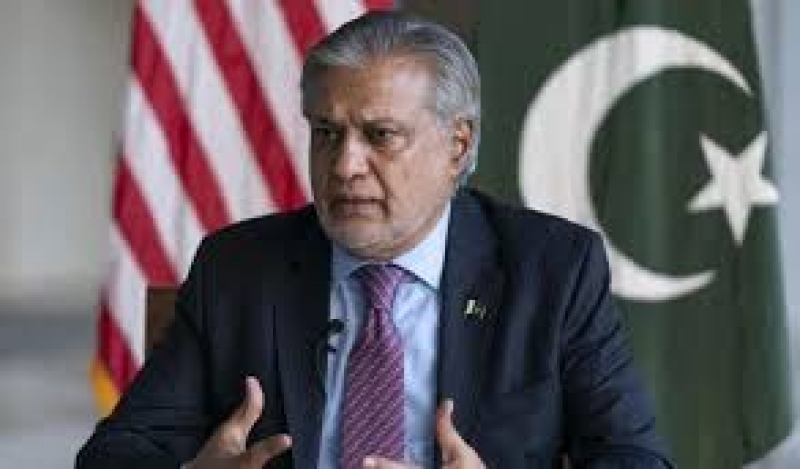- Puppet show enchants Children as Boi Mela comes alive on day 2 |
- DSCC Admin Salam’s drive to make South Dhaka a ‘clean city’ |
- 274 Taliban Dead, 55 Pakistan Troops Killed |
- Now 'open war' with Afghanistan after latest strikes |
- Dhaka's air quality fourth worst in world on Friday morning |
Pakistan FM Arrives Sunday, MoUs on Agenda

Pakistan’s Deputy Prime Minister and Foreign Minister Ishaq Dar is set to arrive in Dhaka on Sunday for a two-day official visit, during which several bilateral agreements are likely to be signed, marking a potential turning point in relations between the two countries.
“This visit holds substantial significance. It’s not yet confirmed how many instruments will be signed, but the likelihood of multiple Memorandums of Understanding (MoUs) being concluded is strong,” a senior Foreign Ministry official told BSS.
Dar's visit will be the first by a Pakistani foreign minister in 13 years, a diplomatic milestone seen by many as a crucial step toward normalizing Bangladesh-Pakistan ties after more than a decade of stagnation.
“This kind of high-level engagement is essential if we want to move toward normalized relations,” the official said, noting that both Dhaka and Islamabad are now demonstrating a renewed willingness to re-engage.
A Decade of Diplomatic Freeze
Relations between the two South Asian nations deteriorated sharply under the previous Awami League government, with both sides scaling back diplomatic contact and imposing strict limitations on visa issuance.
Officials believe that renewed cooperation in trade, easing visa processes, and fostering people-to-people ties are key elements to rebuilding trust. At the same time, Bangladesh expects Pakistan to address a series of historical grievances, including the settlement of financial dues dating back to the pre-independence era.
“The issue of how to equitably divide pre-1971 assets remains unresolved. It's time both countries addressed this,” the foreign ministry official said.
Packed Schedule and Key Meetings
According to the itinerary, Ishaq Dar will arrive in Dhaka on Sunday afternoon via a special flight and will depart on Monday evening.
On Monday morning, he is scheduled to hold bilateral talks with Bangladesh’s Foreign Affairs Adviser Md Touhid Hossain at the State Guest House Padma. Later in the day, he will pay a courtesy call on Chief Adviser Dr Muhammad Yunus, and also meet representatives of Bangladesh’s business community.
The groundwork for Dar’s visit was laid during the Foreign Office Consultation (FOC) held in Dhaka on April 17—the first such meeting in 15 years. Following that dialogue, a joint working group was formed to finalize MoUs in coordination with relevant ministries.
Historical Demands Resurface
At the FOC, Bangladesh urged Pakistan to adopt a “strong forward-looking approach” that includes addressing lingering issues from the 1971 Liberation War. Among the demands were:
A formal public apology for the genocide committed by the Pakistani military during the war.
Repatriation of stranded Pakistanis.
Equitable distribution of undivided Pakistan’s assets.
Return of US$200 million in foreign aid originally allocated for victims of the 1970 Bhola cyclone.
A claim of US$4.3 billion as Bangladesh’s share of pre-independence common assets.
Foreign Secretary Md Jashim Uddin reiterated Dhaka’s position during a media briefing after the FOC, saying that tangible progress on these issues would demonstrate Islamabad’s sincerity in rebuilding bilateral ties.
Expert Opinions and Expectations
Foreign policy experts in Dhaka view Dar’s visit as a potential litmus test for the future of Bangladesh-Pakistan relations.
Ambassador Humayun Kabir, a former diplomat and head of the Bangladesh Enterprise Institute (BEI), said the apology issue raised during the FOC could be a meaningful gesture of reconciliation. “If an apology can help heal old wounds and open a new chapter, there should be no hesitation on Islamabad’s part.”
Former ambassador Mahfuzur Rahman echoed that sentiment, emphasizing that the political-level talks could shape the direction of bilateral relations. “We are hopeful to see follow-up actions on the FOC discussions during Dar’s visit.”
As both sides prepare for this high-profile visit, eyes are now on whether words will translate into action—setting the stage for a new era in Dhaka-Islamabad diplomacy.

